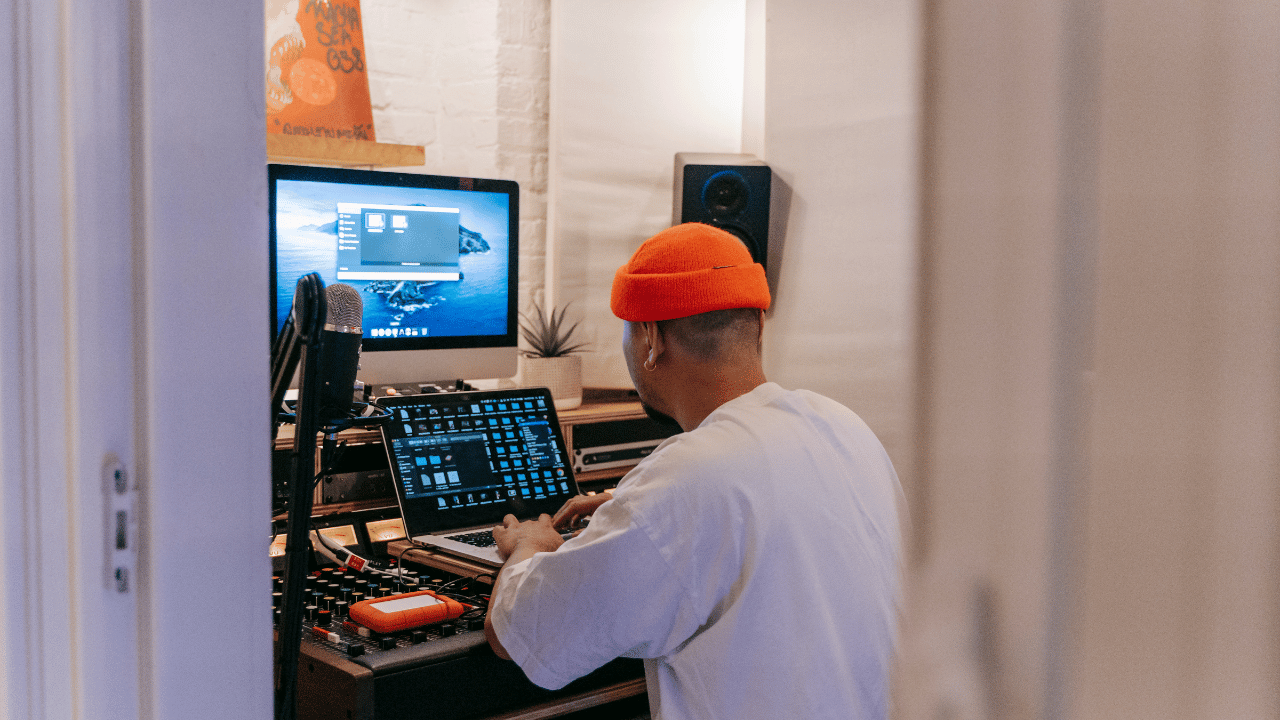Learn Music Production for your New Year's Resolution

The New Year is a time for new beginnings, and for many, that means making resolutions. If you’re anything like me, your resolutions often revolve around improving one thing after another. Whether it’s learning a new skill, reading more books or going to bed earlier, the end goal is the same: become a better version of yourself in 2023.
Are you ready to make 2023 the year that you finally achieve your goal of learning music production? If so, then read on for some tips and guidance on how to set yourself up for success.

Read my blog post The Complete Guide to Learning Music Production: Everything You Need to Know
Setting Goals for Learning Music Production
Goals: First and foremost, it's important to start by defining your goal clearly and specifically. Do you want to learn music production as a hobby, or do you have ambitions to become a professional in the industry? This will help you determine the appropriate level of commitment and focus that you need to apply to your goal.
Resources & Tools: Next, consider what resources and tools you will need in order to learn music production. This may include software such as digital audio workstations (DAWs) like Ableton Live or Logic Pro, as well as hardware such as synthesizers, drum machines, and other music-making devices. Choose the options that best suit your needs and budget, and don't be afraid to invest in quality tools – after all, they will be an integral part of your journey towards mastering music production.
Mindset: It's not just about the tools – it's also about your mindset. In order to succeed in learning music production, you must be disciplined and dedicated to your studies. This may involve setting aside dedicated time each day or week to practice and learn new skills. It can also be helpful to seek out mentors or join a community of like-minded individuals who are also learning music production. This can provide support, motivation, and the opportunity to collaborate and learn from others.
The Process: Finally, don't be afraid to make mistakes and embrace the learning process. Music production can be a complex and nuanced art form, and it takes time and practice to develop your skills. Stay patient, stay focused, and most importantly, have fun! With dedication and hard work, you can achieve your goal of becoming proficient in music production. So don't wait any longer – start your journey towards mastering music production today!
Read my blog post How to Produce a Song: The 7 Stages of Music Production

Sign up for my Intro to Music Production live online course. Make You-Type Beats.
Choosing a DAW
First, you need to decide which DAW (Digital Audio Workstation) you want to learn. Take a look at some of the most popular choices out there and try a couple of them out while you figure out which one is right for your needs. The obvious 4 to look at first are Ableton Live, Logic Pro, FL Studio, Pro Tools. Other potential candidates include Studio One, Reaper and Cubase. Watch some demonstrations on YouTube to get an idea of the type of people using these DAWs and the style of music they create.
Read my blog post on How to Get Started in Music Production: Choosing the Right DAW
Making Beats
"Making beats" can refer to fully produced electronic music instrumentals, or simply creating drum loops for a songwriter’s demo. If you're not a beatmaker but are interested in learning about the beatmaking process, this resolution is for you! Your first steps will be understanding the instrumentation. You will need to learn why certain drums are used and what they do for your beat. The kick drum sets the downbeat, the snare drum provides a contrasting backbeat, and the hi-hat counts out the bars. Next up, you'll need to know about the bassline that pairs with the drums to round out the rhythm section. This bass sound can come from a synth, an electric bass or a customized 808 bassline. In addition to keeping time with the drums, the bassline also provides the root note of the chords used in the beat and a tuning reference for the singer and the melody.
Read my blog post Beatmaking for Beginners: Getting Started Making Beats

Writing Songs
Song Structure: Arranging a song can sound difficult but if you keep things simple it can be easy. You will need to structure the song parts eg. Intro, Verse, Chorus or Intro, Build, Drop and then decide if you need optional parts like a pre-chorus or bridge.
Read my blog post Traditional Song Structure vs EDM Song Structure: What's the Difference?
Instrumentation: Let the song help you decide what instrumentation might work best. If it’s an intimate lyrical subject matter you might choose to keep the instrumentation sparse. If you want it to sound huge, you might add more instruments to the arrangement.
Read my blog post How to Write a Song: Lyrics, Melody & Rhythm
Recording Vocals
Recording vocals is an essential skillset for music production and it can be difficult trying to decide which mic to choose to record into your DAW. Some people prefer expensive and clear sounding condenser mics while others prefer darker, punchier dynamic mics. You can also opt for a handheld mic or budget option like the Shure SM58 or Sony ECM935V. Almost any microphone will do a decent job until you can find the one you're looking for. Once you have recorded some vocals into your DAW you can do some simplecut, copy & paste editing to piece together a vocal composite or “comp” before you process the vocal.
Read my blog post How to Record Vocals at Home Like a Pro
Effects Processing
If you’re looking to make your music more professional, start by learning effects processing. EQ, compression, delay and reverb are four of the most popular effects used in music and vocal production. These four effects can have a huge impact on your vocal clarity, loudness and depth. It’s important to practice using these effects because they will help you get the sound you want in the end.

Download my FREE Guide: Music Production Magic featuring my magic EQ and Compressor settings
Mixing Music and Vocals
One of the most common goals for music producers, in my opinion, is to get better at mixing. This first means getting better at balancing the level of vocals, background vocals, and the instrument tracks your mix. But wait! How do you do this if you're a producer who only has a few tracks to work with? Try recording doubles of some things like vocals or synth lines. Record the same synth line up or down an octave. Try layering drum sounds (just keep an eye on phase coherency or they will end up sounding smaller instead of bigger). Make sure when doubling and stacking parts that each instrument has its own space in the mix and isn’t competing with the vocals.
Read my blog post How To Mix Songs with a DAW
Conclusion: Ring in the new year with some music production fundamentals to step up your musical game. If you’re a beatmaker, rapper, singer, songwriter, musician, DJ or electronic producer, taking the time to learn more about your craft should be a high priority. And don’t forget to have fun doing it!

FAQs
Where can I Learn Music Production?
YouTube: Still the best place to learn anything for free. You just need skills to navigate the overwhelming options of what to learn and who to learn from.
Meetups: If you live in a city with a thriving music scene, then chances are good that there’s a meetup group for music production. Ableton has a user group in most major cities. This is an excellent place to meet other people interested in learning more about music production. There are typically discussions led by industry experts as well as opportunities to network with others in your field.
Workshops: Try to find a free (or cheap) webinar or workshop which can cover everything from the basics to more advanced techniques.
Groups: On platforms like Facebook or Instagram, you can find groups for virtually any subject imaginable—music production being no exception. These groups are a great place to connect with other people who share your interests and learn from their experiences. You can also find tips and advice from other members as well as opportunities to ask questions and get advice from experts in the field.
Online Courses: Online music production courses range from covering one topic (like mixing, Ableton Live, or vocal production) in depth to a complete Intro to Music Production course.
Take my FREE Ableton Live course and make your first song in Ableton Live in just 90 minutes using the free 90-day trial.
Which DAW should I choose?
After watching some YouTube videos to see what the DAW looks like and a little about what it can do, see if there’s a free trial available. Ableton Live and Apple’s Logic both offer a 90-day free trial, and Pro Tools has a free version called Intro.
What is the best vocal microphone?
The Shure SM-58 is the best all-around choice for price, sound and durability. Next up would be the Shure SM7B if you have a little bit of a budget, and finally the Neumann U87 for all you absolute ballers out there.
I'm Futch, a music production coach who not only offers free content and a free Ableton Live online course but also a complete 27-class Live Online Intro to Music Production course, complete with coaching and a community of users. You can find out more and sign up for discounted early access here.

Futch - Music Production Coach and Ableton Certified Trainer
Learn Music Production with my 27-class live online classes and on-demand video training:
Music Production Fundamentals • Writing Exciting Songs • Designing Your Artistic Vision
Make You-Type Beats




